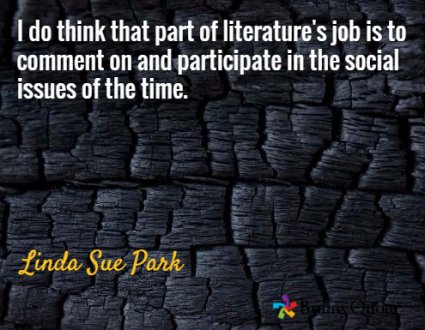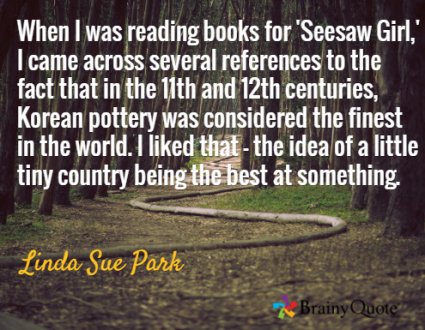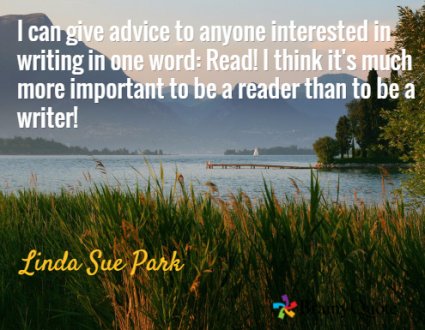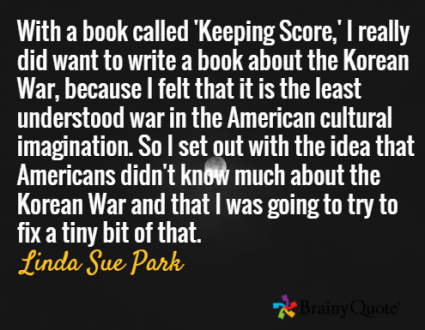The Basics
Born: March 25, 1960 Urbana, IL
Age: 55
Ethnicity: Korean American
Education: M.A. English
Genre: Young Adult Fiction,Poetry Historical Fiction,Biography, Picture Books
Personal Info: Husband; Ben Dobbin and 2 children; Anna and Sean
Other Occupations: Public relations for an oil firm, food journalism, teaching English as a second language to college students
Interesting Fact: Park did not begin writing children's books until after her own children were born.

Parks' first published piece was a haiku she wrote at the age of 9.
In the green forest
A sparkling, bright blue pond hides,
And animals drink.
-Trailblazer magazine, Winter 1969
Park has written the following titles:
Novels:
A Long Walk to Water
Archers Quest
A Single Shard
Click
Keeping Score
Project Mulberry
Seesaw Girl
The 39 Clues: Storm Warning
The 39 Clues: Trust No One
The Kite Fighters
When My Name Was Keoko
Wing and Claw: Forest of Wonders
Picture Books:
Bee-bim Bop!
Mung-Mung: A Fold-Out Book of Animal Sounds
Tap Dancing Roof
What Does Bunny See
Xander's Panda Party
Yaks Yak: Animal word Pairs
Yum! Yuck!: A Fold-Out Book of People Sounds

Quotes
by Linda Sue Park






I chose to highlight the following 3 texts as they represent a pre-k picture book, a mid elementary grade picture book, and a YA novel. The videos to the left each have a segment of the texts read as an example.
Mung-Mung is a pre k book that uses animal sound words in a variety of different languages. Ex: "What kind of animal says GAV-GAV in Russian, BO-BO in Hindi, and WOW-WOW in Spanish?" Then children lift the flap to find out, "It's a dog!"
The Firekeeper's Son is set in early 19th century Korea, after Sang-hee's father injures his ankle, Sang-hee attempts to take over the task of lighting the evening fire, which signals to the palace that all is well. Sang-hee, just once, hoped to see the soldiers who would come if the fire wasn't lit.
"Do not forget, my son, that we are a part of the king's guard just as the soldiers are. We are the very first part." Sang-hee's father smiled. "The village will be pleased to hear that another trustworthy firekeeper has been born to our family." Suddenly, Sang-hee was glad he had lit the fire. The gladness felt as warm as a glowing coal."
When I first started researching authors, I was torn between many. However, I kept coming back to Linda Sue Park again and again. I was attracted to her for many reasons. First of all, she writes books from pre-k to young adult. I am always impressed with authors who are able to hold the interest of both a toddler and a teenager. Next, I love the fact that she extensively researches before beginning her books. Being that she was raised in the United States her entire life, she depended on her parents (who were immigrants) and her extended family members back in Korea to help her understand her Korean history. She didn't stop there, however, she did the research to back up her culturally authentic texts. Also, I really like that she writes books set both in modern day, and in the past. She seems to seamlessly navigate between genres, interest levels, and topics. This is no small feat. Finally, I was drawn to the fact that she wrote A Long Walk to Water. This text is outside the box of her Korean or American heritage and focuses on the biographical account of Salva, a lost boy of Sudan, as well as Nya, a character from today's world. This is not her culture. This is not her heritage. This is not her story. Yet, her talent allowed her to weave the story of Salva and Nya into a beautiful piece which alternates between the two.
I also like the fact that she has won a variety of different awards, (please click on the below link for her author's page which lists these in detail) but none more meaningful to this study than Asian Pacific American Librarians Association and the Asian/Pacific American Award for Literature. These awards said, to me, that not only are her books enjoyable to read, but they are approved by those who would be most in touch with the stereotypes or single story view of a given culture or group. Their stamp of approval prompted me to further look into her works. Her works are diverse racially, culturally, ethnically, linguistically, and in genre. For a diverse author study, I don't know that one could get any more diverse than that.
Since Parks writes such a variety of texts, almost anyone is able to find a mirror text to connect with. For example, I am obviously not Korean, yet I can find a connection with Sang-hee in The Firekeeper's Son. Although he knew he had a responsibility to light the fire, he couldn't help but wonder what it would be like to see the soldiers protect the land he has always known to be peaceful. Who of us hasn't secretly wished something not so good would happen to bring some possible excitement to our lives? However, few if any of us, here in the US have any idea what it is like not to have sanitary drinking water. A Long Walk to Water is definitely a window text into the lives of others and the every day luxuries we take so often for granted. Parks' texts are constantly switching between the two, mirrors for today's middle school students in Project Mayberry to windows to Korean history in A Single Shard. Often, Parks' texts includes both mirrors and windows together when focusing on language in Yum! Yuk! and Mung-Mung, and focusing on family relationships and preparation of food in Bee-bim Bop!
Finally, in the video above, Can a Children's Book Change the World, Park speaks to being picked on and singled out because she was different. She goes on to say, "to the prom queen of 1977 who ignored me, I'm up here on stage giving a Ted Talk!" I always love a girl with a little sass!
The link below is Linda Sue Parks' website. There is a wealth of information on this page including a more detailed biography, a listing of the many awards she has been given, (arranged by book title and including the prestigious Newberry) links with summaries of each of her books, links to other activities, and more. Take a few minutes to check it out. I encourage you to include a few of Park's books on your classroom shelves, and it doesn't matter if you teach Pre-K or high school. She really does have something for everyone.
Back Next
 Magazine Posts
Magazine Posts Table of Contents
Table of Contents